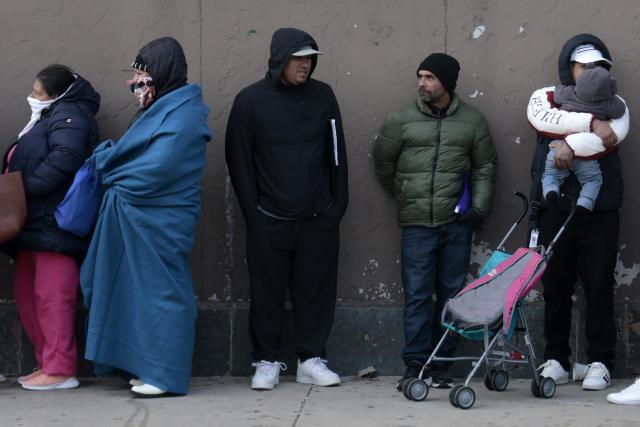The Windy City committed to $1.32 billion in progressive spending packages on Friday, in a four-hour long city council meeting that exposed the council’s deep political and ideological divides.
The money is split between an additional $70 million to continue feeding and housing new immigrants in the city, and $1.25 billion dedicated to creating more affordable housing and economic opportunity across the city over the next five years.
The $1.25 billion proposal, formulated by Mayor Brandon Johnson’s office, also represents an effort by Johnson and other city hall progressives to move away from a development funding model based on tax increment financing districts.

Both proposals were opposed by City Hall conservatives, though the migrant spending package saw pushback from a few typically left-leaning councilors such as Alderwoman Jeanette Taylor. Other progressive, socialist, and Latino alderpeople, despite their own internal divides, were united in declaring the additional $70 million necessary to address the scale of Chicago’s migrant crisis.
Since the summer of 2022, more than 39,000 new immigrants and asylum seekers have arrived in Chicago — many of them sent from the southern border by Republican Texas Governor Gregg Abbott as a deliberate political attack on Democratic bastions — and the city has struggled to ensure they are housed, fed and cared for.
The same struggle has exacerbated racial tensions in the city. On Friday, some Black alders expressed frustration that so many resources have been devoted to caring for new arrivals, while many of Chicago’s Black neighborhoods remain chronically divested. Per city data, Chicago has already dedicated over $310 million towards migrant aid since 2022.
READ ALSO: Federal Government Reiterates Commitment to Affordable Housing for Civil Servants
“I’ll be doggone, I don’t see the Black folks getting that kind of help,” Alderwoman Emma Mitts said at Friday’s meeting. “I don’t see my kids and my children and my neighborhood getting that type of support.”
Despite these criticisms, the $70 million spending package — which will be drawn from Chicago’s 2022 budget surplus fund — easily passed in a 30-18 vote. Alderman Byron Sigcho-Lopez, a longtime immigrant rights advocate who has earned a reputation as one of city council’s most outspoken left-wing figures, denounced some of those who opposed the $70 million in migrant aid as bigots.
“What we see today, again, is the bigotry, the bigotry and the ignorance of the same people that are likely going to vote against the very same thing that they claim [to support]: to put $1.2 billion dollars in the poorest areas of the city of Chicago,” Sigcho-Lopez said.
While some alders took offense at Sigcho-Lopez comments, with one alderman even demanding he make a public apology, his prediction proved true: debate over the $1.25 billion affordable housing plan proved extremely contentious, facing opposition from many of the same alders who voted against the $70 million in migrant aid.
Much of the opposition hinged on a point in Johnson’s plan which allows the city to spend up to $5 million on a given project without needing the city council’s approval.
Twice during Friday’s meeting, alders moved to alter the proposal to lower that approval threshold: business-friendly Alderman Brendan Reilly tried to make it $1 million, and in a last ditch compromise, prominent conservative Alderman Ray Lopez proposed $2.5 million.
Another alderman, Bill Conway, also tried to reduce the spending total to $750 million. These efforts failed due to progressive Alderman Daniel La Spata using a parliamentary maneuver to put their altered proposals to a vote, all of which sputtered.
Had either the $1 or $2.5 million project approval thresholds passed, it would have undercut Johnson and his progressive allies’ development agenda over the next several years, allowing alders to vote on an increased number of projects that Johnson’s opponents might try to block.
La Spata acknowledged this in a short speech where he defended his actions to the rest of the council.
“I didn’t do it to be obstructionist, I didn’t do it to be disagreeable, I didn’t do it to be funny,” he said. “I did it because I believe in this ordinance. I don’t believe in 95% of it, I don’t believe in 98% of it, I believe in 100% of this ordinance. Since the time I was in Chicago reading about TIFs, I wanted to see a path forward past TIFs.”
READ ALSO: Nigeria Police Housing Scheme: IGP Egbetokun’s Vision
As La Spata alluded to, the ordinance calls for the city to make use of its existing tax increment financing districts as they expire. These districts cover a designated area of the city, and use tax revenue generated there to fund further development in the district. While these districts have been a major part of how the city funds development for decades, they have faced criticism on a number of fronts, including lack of transparency and abetting gentrification.
In 2022, Taylor criticized Whole Foods for taking tax increment financing funds to build a grocery store in a Black south side neighborhood, only for the company to pull out and leave the area a food desert once the location proved unprofitable.
“You got our TIF money and now you’re leaving with our TIF money,” Taylor said at the time. “These companies don’t care about us.”
There are over 120 of such districts active in Chicago currently, with a third of them set to expire by the end of 2027. The mayor’s plan is to take the funds generated by the city’s expiring the districts, up to $250 million annually, and split them evenly between the city’s Department of Housing and Department of Planning and Development.
His plan ended up passing 32-17, and in a press conference after the meeting concluded, Johnson said he had “specific” plans for how the money will be spent. His office’s written proposal lays out several projects focused on majority-Black south and west side neighborhoods of Austin, Auburn Gresham, Garfield Park, Humboldt Park and Englewood.
“We have provided a very specific layout of the areas of focus for these bonds and how these deals will ultimately help transform communities,” Johnson said.



